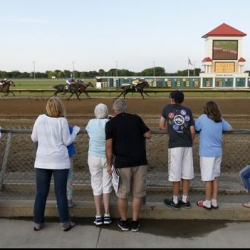
The Des Moines Register said in December 2015 that Prairie Meadows Casino has some of the tightest slots in the United States.
The largest casino in Iowa is facing a federal review by the IRS. If it fails the review, then the casino is going to lose its nonprofit status. The casino has tax-exempt status, because it is paying off construction debts.
At the moment, Prairie Meadow Racetrack and Casino pays over $14 million every year to wipe out the construction debt of Iowa Events Center. Because of those payments, Prairie Meadows is able to claim it is a nonprofit organnzation. One local official says that money would disappear, if the IRS revoked the casino’s tax-exempt status.
Lawsuit Could Be Filed
Tom Hockensmith, who is Polk County Supervisor, said the event center would not exist without the Prairie Meadows Racetrack and Casino. The casino is planning litigation, if the IRS tries to remove its status. The Prairie Meadows board members met on Friday to discuss the nature of that litigation.
IRS Observation
This story has been brewing for some time. For the past 18 months, the casino’s finances have been under the watch of the Internal Revenue Service. That fact recently came to the attention of officials at Prairie Meadows, who express shock and dismay at the turn of events.
Tom Flynn, an attorney for Prairie Meadows, said it was astounding to the board to learn they were in the eye of the IRS. Flynn said, “We were bewildered by that, and as we look at the facts and at the law, we are confident we should have that tax status. And it should not be revoked.”
Turnover, Gross Revenues, and Profits
The latest revenue details released to the public were from 2013. According to those figures, Prairie Meadow Racetrack and Casino had $2.1 billion in turnover in 2013. “Turnover” is the amount of money wagered — also known as “the action”. Not all of this money is revenue, but it represnts the amount of money handled.
About 85% to 90% of that money was returned to gamblers in winnings. The rest was kept by Prairie Meadows as “gross operating revenues”. This does not represent profits, because the casino operation has to pay wagers for exmployees, salaries for managers, utilities, maintenance costs, and security costs. It also has to pay for renovations, while paying all local, county, and state fees.
The money left over still does not represent revenues, because most businesses have debts they need to pay — interests on loans. In the case of Prairie Meadow, some of the interest it owes is $14 million in construction costs from loans on the original development plan.
Contributions to the Community
The casino also contributes to the community in other ways. To obtain a license, casino operators sometimes agree to make contributions to civic projects and building costs in the local areas. Some casinos offer to become a patron of the arts, to help beautify the area, or to build railway bridges (or other measures to help mimimize traffic jams). These are all examples other casinos have done in just the last few years.
Tom Flynn says local communities would miss about $20 million in grants from Prairie Meadows woiuld be lost, if it lost its tax-exempt status. The money instead would go to paying the IRS.
Des Moines School System
Phil Roeder, a spokesman for the Des Moines Public School system, said that the DMISD receives between $450,000 and $500,000 a year in contributions from Prairie Meadows Casino. That money goes to technological improvements.
For instance, Roeder said the $450k was spent last year on new musical instruments for children throughout the Des Moines school system. With the influx of cash, students have taken a greater interest in music classes. Roeder said, “We’ve seen a huge increase in band and orchestra participation over the last couple of years in the school district, so we really want to make that investment and provide instruments to as many kids as we can who cannot afford them.”
Polk County Contributions
The dispensation goes to many sources in the area. For instance, Polk County itself received $26 million in 2012. The City of Des Moines received $5 million. The City of Altoona receive $1 million. A number of different local charities received $4 million combined, while schools throughout Polk County received $800,000.
A great deal of that money which goes to nearby causes would instead go to the U.S. Treasury. The money would be missed by the locals.
Not Related to CEO’s Salary
Tom Flynn denied reports that the IRS audit was triggered because of the $650,000 salary paid to Prairie Meadows chief executive Gary Palmer. Mr. Flynn said that a similar audit happened 10 years ago, so this is a routine procedure — if one fraught with stress for the audited.
